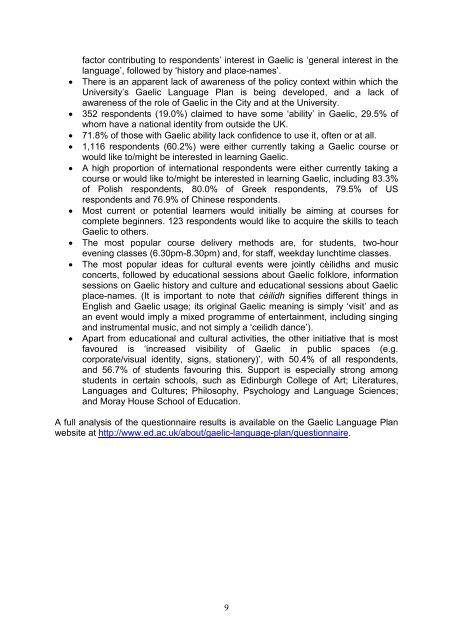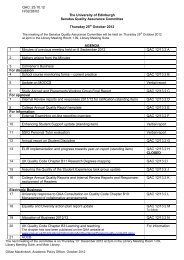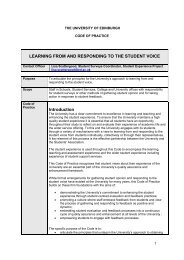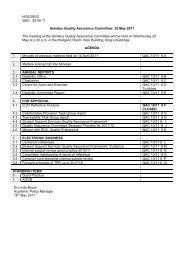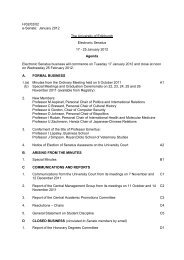Chapter 3 â Policy Implications for Gaelic - University of Edinburgh
Chapter 3 â Policy Implications for Gaelic - University of Edinburgh
Chapter 3 â Policy Implications for Gaelic - University of Edinburgh
You also want an ePaper? Increase the reach of your titles
YUMPU automatically turns print PDFs into web optimized ePapers that Google loves.
factor contributing to respondents’ interest in <strong>Gaelic</strong> is ‘general interest in the<br />
language’, followed by ‘history and place-names’.<br />
There is an apparent lack <strong>of</strong> awareness <strong>of</strong> the policy context within which the<br />
<strong>University</strong>’s <strong>Gaelic</strong> Language Plan is being developed, and a lack <strong>of</strong><br />
awareness <strong>of</strong> the role <strong>of</strong> <strong>Gaelic</strong> in the City and at the <strong>University</strong>.<br />
352 respondents (19.0%) claimed to have some ‘ability’ in <strong>Gaelic</strong>, 29.5% <strong>of</strong><br />
whom have a national identity from outside the UK.<br />
71.8% <strong>of</strong> those with <strong>Gaelic</strong> ability lack confidence to use it, <strong>of</strong>ten or at all.<br />
1,116 respondents (60.2%) were either currently taking a <strong>Gaelic</strong> course or<br />
would like to/might be interested in learning <strong>Gaelic</strong>.<br />
A high proportion <strong>of</strong> international respondents were either currently taking a<br />
course or would like to/might be interested in learning <strong>Gaelic</strong>, including 83.3%<br />
<strong>of</strong> Polish respondents, 80.0% <strong>of</strong> Greek respondents, 79.5% <strong>of</strong> US<br />
respondents and 76.9% <strong>of</strong> Chinese respondents.<br />
Most current or potential learners would initially be aiming at courses <strong>for</strong><br />
complete beginners. 123 respondents would like to acquire the skills to teach<br />
<strong>Gaelic</strong> to others.<br />
The most popular course delivery methods are, <strong>for</strong> students, two-hour<br />
evening classes (6.30pm-8.30pm) and, <strong>for</strong> staff, weekday lunchtime classes.<br />
The most popular ideas <strong>for</strong> cultural events were jointly cèilidhs and music<br />
concerts, followed by educational sessions about <strong>Gaelic</strong> folklore, in<strong>for</strong>mation<br />
sessions on <strong>Gaelic</strong> history and culture and educational sessions about <strong>Gaelic</strong><br />
place-names. (It is important to note that cèilidh signifies different things in<br />
English and <strong>Gaelic</strong> usage; its original <strong>Gaelic</strong> meaning is simply ‘visit’ and as<br />
an event would imply a mixed programme <strong>of</strong> entertainment, including singing<br />
and instrumental music, and not simply a ‘ceilidh dance’).<br />
Apart from educational and cultural activities, the other initiative that is most<br />
favoured is ‘increased visibility <strong>of</strong> <strong>Gaelic</strong> in public spaces (e.g.<br />
corporate/visual identity, signs, stationery)’, with 50.4% <strong>of</strong> all respondents,<br />
and 56.7% <strong>of</strong> students favouring this. Support is especially strong among<br />
students in certain schools, such as <strong>Edinburgh</strong> College <strong>of</strong> Art; Literatures,<br />
Languages and Cultures; Philosophy, Psychology and Language Sciences;<br />
and Moray House School <strong>of</strong> Education.<br />
A full analysis <strong>of</strong> the questionnaire results is available on the <strong>Gaelic</strong> Language Plan<br />
website at http://www.ed.ac.uk/about/gaelic-language-plan/questionnaire.<br />
9


